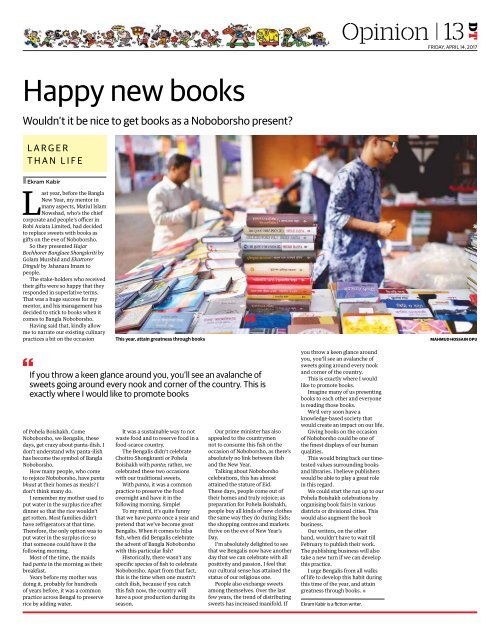DT e-Paper 14 April 2017
Create successful ePaper yourself
Turn your PDF publications into a flip-book with our unique Google optimized e-Paper software.
Opinion 13<br />
FRIDAY, APRIL <strong>14</strong>, <strong>2017</strong><br />
<strong>DT</strong><br />
Happy new books<br />
Wouldn’t it be nice to get books as a Noboborsho present?<br />
LARGER<br />
THAN LIFE<br />
• Ekram Kabir<br />
Last year, before the Bangla<br />
New Year, my mentor in<br />
many aspects, Matiul Islam<br />
Nowshad, who’s the chief<br />
corporate and people’s officer in<br />
Robi Axiata Limited, had decided<br />
to replace sweets with books as<br />
gifts on the eve of Noboborsho.<br />
So they presented Hajar<br />
Bochhorer Banglaee Shongskriti by<br />
Golam Murshid and Ekattorer<br />
Dinguli by Jahanara Imam to<br />
people.<br />
The stake-holders who received<br />
their gifts were so happy that they<br />
responded in superlative terms.<br />
That was a huge success for my<br />
mentor, and his management has<br />
decided to stick to books when it<br />
comes to Bangla Noboborsho.<br />
Having said that, kindly allow<br />
me to narrate our existing culinary<br />
practices a bit on the occasion<br />
This year, attain greatness through books<br />
MAHMUD HOSSAIN OPU<br />
If you throw a keen glance around you, you’ll see an avalanche of<br />
sweets going around every nook and corner of the country. This is<br />
exactly where I would like to promote books<br />
of Pohela Boishakh. Come<br />
Noboborsho, we Bengalis, these<br />
days, get crazy about panta-ilish. I<br />
don’t understand why panta-ilish<br />
has become the symbol of Bangla<br />
Noboborsho.<br />
How many people, who come<br />
to rejoice Noboborsho, have panta<br />
bhaat at their homes as meals? I<br />
don’t think many do.<br />
I remember my mother used to<br />
put water in the surplus rice after<br />
dinner so that the rice wouldn’t<br />
get rotten. Most families didn’t<br />
have refrigerators at that time.<br />
Therefore, the only option was to<br />
put water in the surplus rice so<br />
that someone could have it the<br />
following morning.<br />
Most of the time, the maids<br />
had panta in the morning as their<br />
breakfast.<br />
Years before my mother was<br />
doing it, probably for hundreds<br />
of years before, it was a common<br />
practice across Bengal to preserve<br />
rice by adding water.<br />
It was a sustainable way to not<br />
waste food and to reserve food in a<br />
food-scarce country.<br />
The Bengalis didn’t celebrate<br />
Choitro Shongkranti or Pohela<br />
Boishakh with panta; rather, we<br />
celebrated these two occasions<br />
with our traditional sweets.<br />
With panta, it was a common<br />
practice to preserve the food<br />
overnight and have it in the<br />
following morning. Simple!<br />
To my mind, it’s quite funny<br />
that we have panta once a year and<br />
pretend that we’ve become great<br />
Bengalis. When it comes to hilsa<br />
fish, when did Bengalis celebrate<br />
the advent of Bangla Noboborsho<br />
with this particular fish?<br />
Historically, there wasn’t any<br />
specific species of fish to celebrate<br />
Noboborsho. Apart from that fact,<br />
this is the time when one mustn’t<br />
catch ilish, because if you catch<br />
this fish now, the country will<br />
have a poor production during its<br />
season.<br />
Our prime minister has also<br />
appealed to the countrymen<br />
not to consume this fish on the<br />
occasion of Noboborsho, as there’s<br />
absolutely no link between ilish<br />
and the New Year.<br />
Talking about Noboborsho<br />
celebrations, this has almost<br />
attained the stature of Eid.<br />
These days, people come out of<br />
their homes and truly rejoice; as<br />
preparation for Pohela Boishakh,<br />
people buy all kinds of new clothes<br />
the same way they do during Eids;<br />
the shopping centres and markets<br />
thrive on the eve of New Year’s<br />
Day.<br />
I’m absolutely delighted to see<br />
that we Bengalis now have another<br />
day that we can celebrate with all<br />
positivity and passion. I feel that<br />
our cultural sense has attained the<br />
status of our religious one.<br />
People also exchange sweets<br />
among themselves. Over the last<br />
few years, the trend of distributing<br />
sweets has increased manifold. If<br />
you throw a keen glance around<br />
you, you’ll see an avalanche of<br />
sweets going around every nook<br />
and corner of the country.<br />
This is exactly where I would<br />
like to promote books.<br />
Imagine many of us presenting<br />
books to each other and everyone<br />
is reading those books.<br />
We’d very soon have a<br />
knowledge-based society that<br />
would create an impact on our life.<br />
Giving books on the occasion<br />
of Noboborsho could be one of<br />
the finest displays of our human<br />
qualities.<br />
This would bring back our timetested<br />
values surrounding books<br />
and libraries. I believe publishers<br />
would be able to play a great role<br />
in this regard.<br />
We could start the run up to our<br />
Pohela Boishakh celebrations by<br />
organising book fairs in various<br />
districts or divisional cities. This<br />
would also augment the book<br />
business.<br />
Our writers, on the other<br />
hand, wouldn’t have to wait till<br />
February to publish their work.<br />
The publishing business will also<br />
take a new turn if we can develop<br />
this practice.<br />
I urge Bengalis from all walks<br />
of life to develop this habit during<br />
this time of the year, and attain<br />
greatness through books. •<br />
Ekram Kabir is a fiction writer.


















